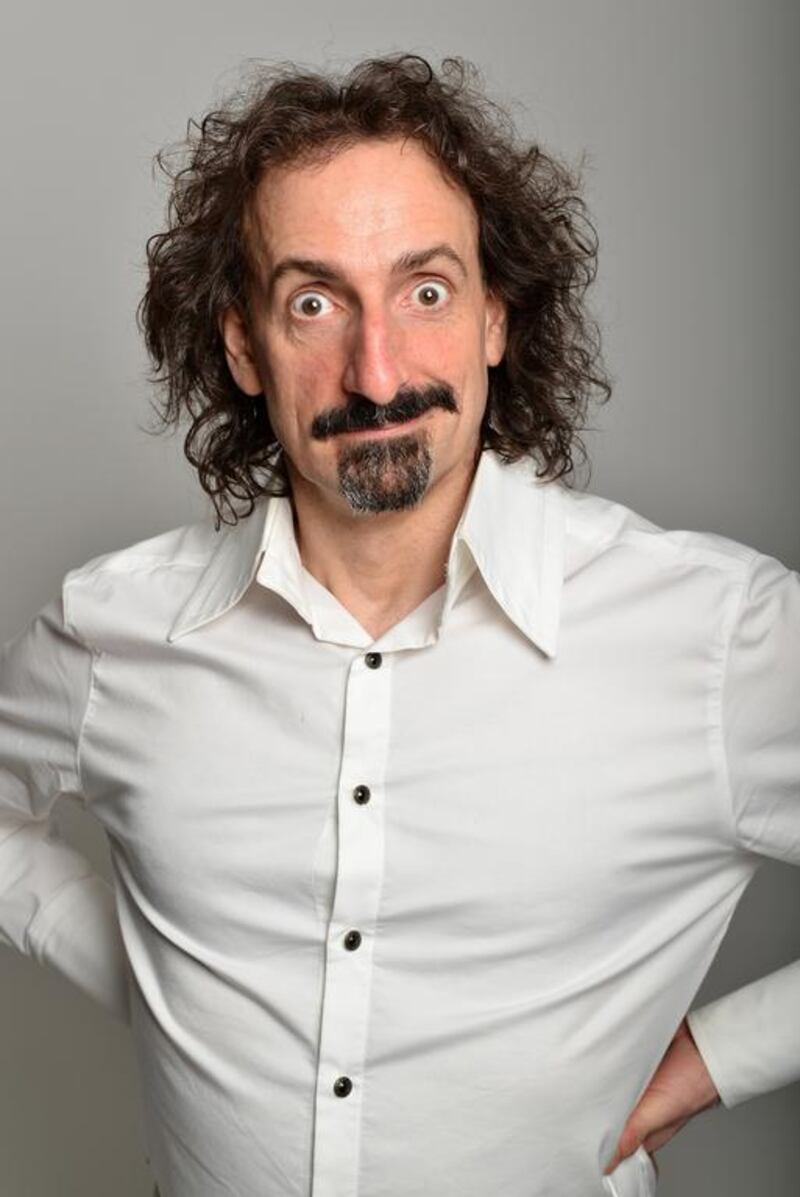Anyone who says you can’t learn to be funny should have a word with Addy van der Borgh.
The surrealist stand-up comedian was too scared to appear on stage before he plucked up the courage to enrol in a comedy workshop. More than 20 years ago since that fateful day, the British funnyman has not had to do anything else for a living.
He has, however, found time to widen his knowledge by taking several courses formally studying the art of clowning.
Van der Borgh – who appears at The Laughter Factory in Abu Dhabi and Dubai this week – was a decidedly late bloomer.
Yet he fell in love with Monty Python by listening to audio collections of the team’s sketches when he was 8 years old, and was the self-confessed “class clown” at school. During a decade spent working as a barman and a delivery driver, he regularly sent jokes to topical BBC radio comedy shows, but none were used.
Then finally, at the age of 27, he mustered the self-belief to enrol in the comedy equivalent of evening school.
“I always wanted to do [stand-up], but I was not fully confident,” the 50-year-old says. “I was getting increasingly frustrated, and then I saw an advert in a paper for a comedy course, once a week for eight weeks, with a gig at the end. I thought, if I don’t do this, I’ll just give up on the dream – it’s not going to get any more accessible than that.”
Van der Borgh’s first five minutes onstage were a success.
“As I walked off stage, I thought this is it, this is what I’m going to do,” he adds.
His first paying gig – after winning the prize at an amateur night at London’s Comedy Café – solidified this determination to pursue this newfound calling.
“I did 10 minutes onstage and the manager gave me 25 quid, and I thought, this is more money than I get working for five hard hours in a pub – it was a no-brainer,” he says.
“And you get better as you go on – 25 quid becomes 200 quid eventually.”
Some of his earnings paid for further studies to become a qualified clown. Van der Borgh says he also took four courses on the arts of physical comedy.
“Just in case there’s an emergency and you need someone to do some juggling,” he says, before adding, more seriously: “I hardly juggle. I studied clowning, but I’m not what you’d call a circus clown – more theatre clown. Slightly more highbrow clowning – but it is clowning, essentially.”
Van der Borgh’s combination of traditional comedy storytelling – near-universal observations about “relationships and travel” – with a flair for the theatrical has come to define his brand of surrealist stand-up. He draws a distinction between his style and what he calls “pure” observational comics, but adds that his surrealism never reaches the absurdist extremes of recent Dubai visitor Eddie Izzard.
“I’ve met a lot of people I’d consider pure comics, such as Chris Rock and Daniel Kitson, and they are like that all the time,” he says. “Their persona offstage is the same onstage, really, whereas I kind of go into a sort of persona.”
Elements of this persona first developed as a child, when Van der Borgh began showing off while craving parental attention. Yet despite more than 20 years of onstage theatrics, he still describes himself as “quite introverted and shy”.
It is a familiar story – the comedy scene is littered with meek and socially awkward types who can whip up comedic tsunamis onstage, but return to hide in the corner the minute the lights go up. Why does a job that requires such extreme charisma – and carries perhaps the greatest risk of daily humiliation of any profession – stereotypically attract so many withdrawn, self-effacing misanthropes?
“There’s lot of shy, introverted and depressed people who don’t do stand-up comedy, but work in banks,” says Van der Borgh “Obviously you’ve got to have a desire to do it – and you’ve got to think you’re very funny, or why would you get up there and try to prove it to the world?”
• The Laughter Factory is at Park Rotana, Abu Dubai on Wednesday, 8pm; Grand Millennium, Tecom, Dubai on Thursday, 9pm; and The Gramercy, DIFC, on Friday, 9pm. Tickets are Dh140, from www.thelaughterfactory.com










